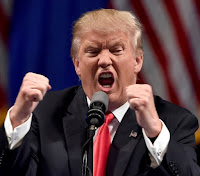Capital Gazette reporter Phil Davis @PhilDavis_CG on Twitter: “There is nothing more terrifying than hearing multiple people get shot while you’re under your desk and then hear the gunman reload.”
Donald Trump @realDonaldTrump on Twitter Jul 3 : "The Washington Post is constantly quoting “anonymous sources” that do not exist. Rarely do they use the name of anyone because there is no one to give them the kind of negative quote that they are looking for. They are a disgrace to journalism but then again, so are many others!"
Ben Fenton @benfenton on Twitter: "If there is even a hint of a connection between the Annapolis murderer and alt-right/Trumpian hate speech against journalists, then there has to be an end to the President’s games. Any more of that rhetoric will be incitement to murder, pure and simple."
Kyle Pope in the Columbia Journalism Review: "Our focus this long two years has been on the big, high-profile news organizations that most occupy Trump’s obsessions and his Twitter feed. They are what we think about when we worry about threats to the press, and they have become stand-ins for those, inside the government and out, who rail against fake news. But what we missed is that for most Americans, the media is not some big-city skyscraper or national TV network with layers of security, where everybody needs a badge to get in. It’s our local newsroom down the street, staffed by professionals reporting on what matters most to people where they live. We’re reminded this week that in the war against the press, they may well be the journalists in America who are most at risk."
The Guardian in a leader: "Honest journalism is a vital part of any decent society. Fearless journalism is a sign, and a part of the defences, of any free society. The trade can be grubby and – perish the thought – self-important but it gives us a warped mirror of our flawed selves and what we all learn from it is more important than the flaws. This is particularly true of local journalism because the local papers write about their readers and not about half-mythical celebrities. They help communities to recognise themselves in their common humanity and, at their best, can help them to come together."
Fintan O'Toole in The Observer: "Carole Cadwalladr has placed herself on the frontline in the fight to preserve open societies against rich, powerful and ruthless enemies. She has done so with the courage, skill, resilience and undaunted optimism of one who believes that fight can and must be won."
Camilla Long in the Sunday Times [£] reviewing the documentary Reporting Trump’s First Year — The Fourth Estate about the New York Times: "If you are a journalist, you dream of television like this, of the camera hotly panning over some late-night conference as dishevelled hacks rush towards a scoop. The curse of print journalists is that they have all the urges and desires of TV stars, but rarely work in front of the camera. By “rarely work”, of course, I mean “are hideous” — we are a dismal phylum of pasty, anxious, shrivelled, crusty-socked, nose-picking lemurs and gargoyles."
Carrie Gracie after winning her fight for equal pay with the BBC, as reported by BBC News: "In acknowledging the value of my work as China editor, the BBC has awarded me several years of backdated pay. But for me this was always about the principle and not about the money, so I'm giving all of that money away to help women who need it more than I do. After all, today at the BBC I can say I am equal.'
From the Society of Editors: "Research, conducted by Mediatique, has found that circulation and print advertising revenues have dropped by more than half over the last decade, from nearly £7 billion to just over £3 billion. Over the same time, the number of frontline print journalists has dropped by over 25% - from around 23,000 in 2007 to 17,000 in 2017."
[£] =paywall











No comments:
Post a Comment